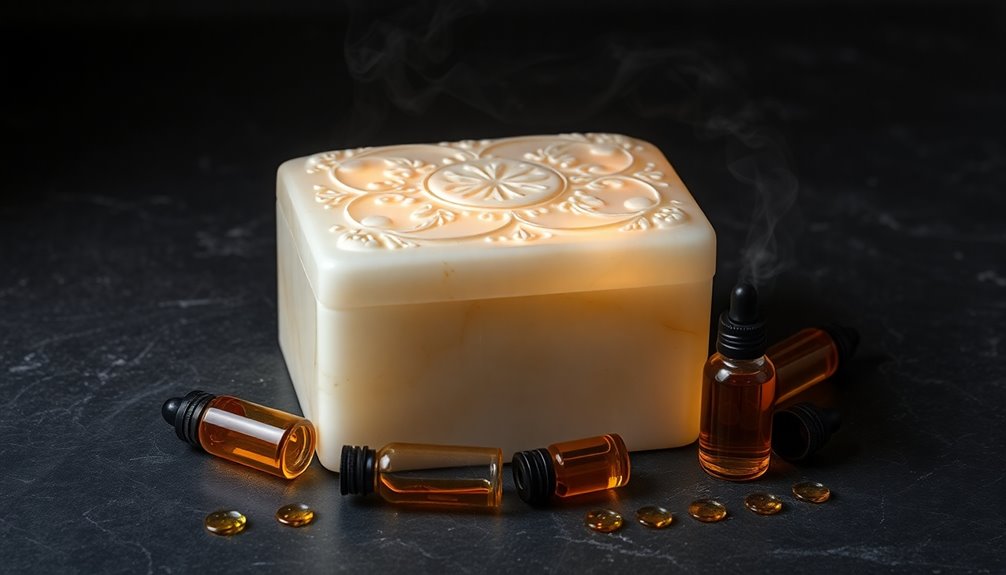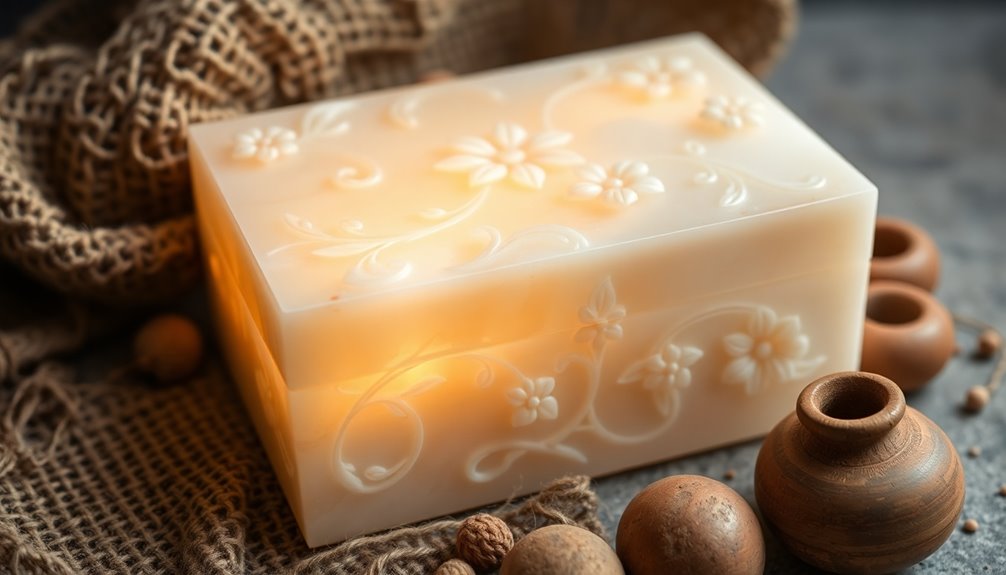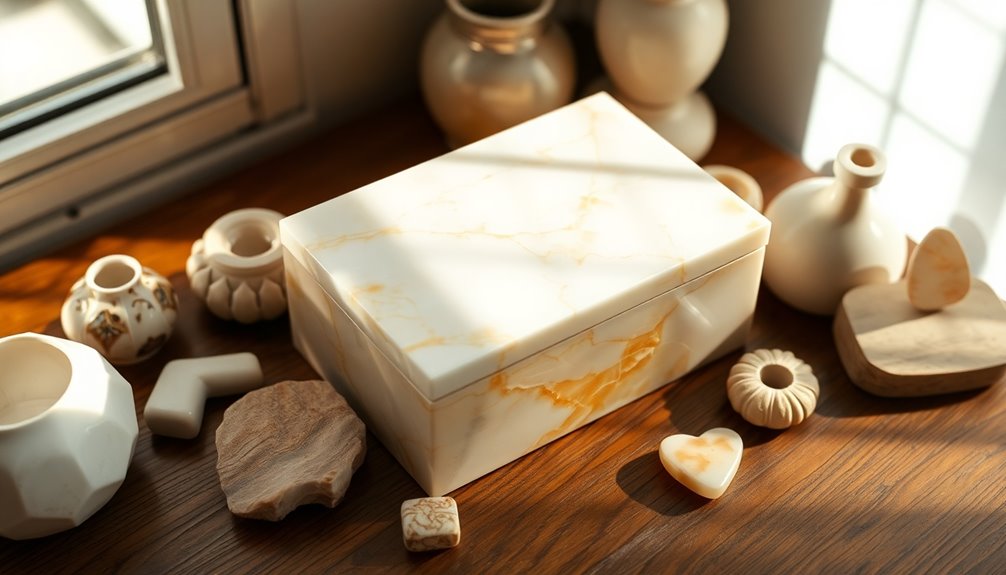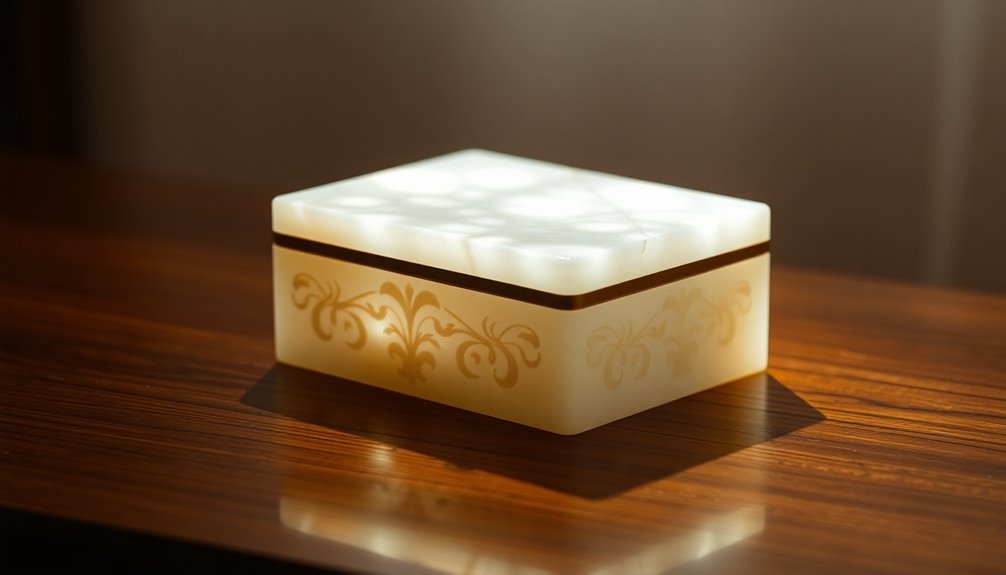The Alabaster Box symbolizes deep devotion and personal sacrifice, particularly in biblical accounts where figures like Mary anoint Jesus' feet. Its presence highlights themes of gratitude, honor, and faith, reflecting a transformation. Made from alabaster, these containers were often used for precious oils and perfumes, signifying wealth and spiritual significance. While critics may view this act as wasteful, the true value lies in the heartfelt expression of worship. This narrative invites you to consider your own acts of devotion and what they signify. If you're curious about its cultural impact and deeper meanings, there's more to explore.
Key Takeaways
- The alabaster box symbolizes profound respect, honor, and personal devotion towards Jesus in biblical narratives.
- It is referenced in several scriptures, including Matthew 26, Mark 14, and John 12.
- Alabaster containers were valued for their beauty and used to store precious oils and perfumes in ancient cultures.
- The financial cost of the perfume inside often overshadows its deeper spiritual value and act of worship.
- Community initiatives, like acts of kindness, reflect the spirit of devotion seen in the alabaster box's significance.
Introduction

In the context of biblical history, the alabaster box holds profound significance. You might know that this container, made from a hard stone resembling white marble, was traditionally used to store valuable oils and perfumes, ensuring their purity. The four gospels provide diverse accounts of women who used the alabaster box to anoint Jesus, each story highlighting acts of respect and honor.
In ancient Israel, alabaster was a luxury material, found in precious items and even in the decoration of Solomon's temple. When you read these accounts, you recognize that the act of anointing with oil from the alabaster box symbolizes deep gratitude, devotion, and acknowledgment of Jesus' divine role, especially as he faced impending sacrifice.
Moreover, the alabaster box serves as a powerful metaphor for personal sacrifice and transformation in faith. It reminds you of the importance of worship and expressing love toward Jesus. Each story invites you to reflect on how you might honor your own faith and the significance of your actions in your spiritual journey.
The alabaster box, therefore, becomes a timeless symbol of devotion and reverence in your relationship with the divine.
Biblical Texts Overview

Let's explore the primary and secondary biblical references that highlight the significance of the alabaster box.
You'll find that each account reveals unique aspects of devotion and worship towards Jesus.
Primary Bible References
Many readers find the story of the alabaster box deeply moving, as it highlights key moments in the Gospels where women express their devotion to Jesus. The alabaster box is specifically referenced in Matthew 26:6–13 and Mark 14:3–9, where an unnamed woman anoints Jesus' head with expensive perfume. This act of devotion signifies her deep respect for Him.
In John 12:1–8, you encounter Mary, the sister of Martha, who anoints Jesus' feet with costly perfume from an alabaster jar. This account stands apart from the previous ones, emphasizing the personal nature of her worship.
Additionally, Luke 7:36–50 recounts a separate incident featuring a sinful woman who anoints Jesus' feet with her tears and wipes them with her hair. This powerful gesture illustrates forgiveness and humility, further enriching the theme of women's roles in Jesus' ministry.
Alabaster, valued for its beauty and strength, symbolizes purity and devotion, making it a fitting vessel for precious perfumes.
Each of these instances showcases significant themes of respect, honor, and personal devotion, inviting you to reflect on the profound impact of these women's actions.
Secondary Bible References
The alabaster box appears in various biblical accounts, each revealing unique dimensions of devotion and worship. You'll find references in Matthew 26:6–13, Mark 14:3–9, John 12:1–8, and Luke 7:36–50, where women anoint Jesus with precious oils from these containers.
The Greek term "alabastron" signifies a vessel made from alabaster, a stone valued for its durability, ensuring the purity of the oils inside.
These passages highlight the profound respect, love, and devotion these women had for Jesus, often expressed through emotional acts of gratitude and humility. The anointing symbolizes a personal sacrifice, illustrating how devotion in faith can lead to transformation. The alabaster box isn't just a physical object; it becomes a metaphor for what true worship looks like.
In ancient Israel, alabaster held cultural and religious significance, often used to adorn important structures like Solomon's temple. This context deepens your understanding of the alabaster box's role in biblical narratives, emphasizing the importance of the act of anointing as a powerful expression of worship.
Each account encourages you to reflect on your own devotion and the sacrifices you're willing to make in your faith journey.
Ancient Perfume Trade Practices

In ancient times, the perfume trade flourished, driven by a fervent desire for fragrant oils that played vital roles in daily life, rituals, and commerce. You'd find that alabaster containers became the preferred choice for storing these precious oils. Their porous nature allowed for a gradual release of fragrances, ensuring the oils remained potent and aromatic.
Trade routes crisscrossed the ancient world, enabling the exchange of perfumes crafted from rare and exotic ingredients like myrrh, frankincense, and spikenard. These exquisite concoctions were often presented in beautifully carved alabaster vessels, which not only served a practical purpose but also symbolized the value and purity of their contents. The use of alabaster reflected the wealth and status of the owner, making it a prized possession.
Ancient texts from Egypt and the Mediterranean further highlight the significance of perfumes in religious rituals and personal grooming. You'd see how these fragrant oils weren't merely for pleasure but served as offerings to deities and played essential roles in cultural practices.
The perfume trade thus represented a blend of artistry, spirituality, and commerce, deeply woven into the fabric of ancient societies.
Cultural Significance of Alabaster

Alabaster's allure extends beyond its practical applications in the perfume trade; it holds deep cultural significance across various ancient societies. You'll find that this fine-grained stone, often resembling white marble, was highly valued for its beauty and strength.
Alabaster boxes were crafted to store precious oils and perfumes, showcasing their importance in maintaining the purity of valuable substances. Sealed with wax, these containers preserved the fragrant contents, reflecting their practical use in daily life.
In ancient rituals and architecture, alabaster's role became even more pronounced. Its use in the decoration of structures like Solomon's temple underscores its association with beauty and purity.
Alabaster containers weren't just vessels; they were integral to significant religious and social ceremonies, emphasizing the cultural importance of fragrance and anointing.
Moreover, alabaster's presence in literary references, such as the Song of Songs, illustrates its symbolic value in representing love and beauty. This connection in ancient poetry enriches our understanding of alabaster's role in cultural narratives, making it much more than a mere stone—it's a symbol of deep human values and traditions.
Common Misunderstandings About Alabaster

You might think an alabaster box is just a simple container, but it actually represents something much deeper.
Many people confuse its cost with its true value, overlooking the devotion and sacrifice it symbolizes in biblical accounts.
Let's clarify these common misconceptions to better understand the significance of alabaster.
Debunk Alabaster Misconceptions
Misconceptions about alabaster abound, often leading to confusion about its true nature and historical significance. Many people mistake alabaster for marble, but it's actually a softer stone made primarily of gypsum or calcite. This softness makes it ideal for intricate carvings and decorative pieces, setting it apart from harder stones.
Additionally, you might encounter the term "alabastron," which specifically refers to containers made of alabaster used for storing expensive perfumes and oils. This distinction is crucial, as it highlights the material's use beyond mere decoration.
Also, you may not realize that alabaster boxes were typically sealed with wax to maintain the purity and fragrance of their contents, a detail often overlooked in biblical contexts.
While alabaster has historical ties to grand structures like Solomon's temple, its true significance in biblical narratives lies in its role as a vessel for precious anointing oils.
Finally, remember that not all alabaster boxes were the same; they varied in shape, size, and design, reflecting the diverse artistic styles and cultural meanings of the time. Understanding these nuances helps clarify the rich legacy of alabaster.
Cost vs. Value Debate
While many people focus solely on the financial cost of the alabaster box and its precious contents, it's essential to recognize the deeper value that lies within this biblical narrative. The perfume, valued at a year's wages, illustrates a profound devotion to Jesus, showcasing that true worth isn't measured by monetary terms. Instead, it reflects the sacrificial nature of the offering.
Critics of this act often equated high cost with wastefulness, missing the heartfelt expression of honor at its core. You see, the alabaster box represents more than just a financial transaction; it embodies personal transformation and gratitude for Jesus' divine significance in the lives of those who encountered Him.
Misunderstanding the cost of the alabaster box can lead to overlooking its theological implications. It challenges you to consider that true value lies in the heart behind the offering, rather than just its price tag.
The act of anointing Jesus conveys a worshipful acknowledgment that transcends material worth, emphasizing that your devotion and love for Him are what truly matter. In this debate of cost versus value, let your perspective shift to appreciate the depth of meaning behind the alabaster box.
Daily Acts of Kindness

You can make a difference in your community through simple acts of kindness every day.
Whether it's helping a neighbor or participating in local service initiatives, your generosity can inspire others to join in. Engaging in self-care practices not only benefits you but also enhances the positive impact you can have on those around you.
Generosity in Everyday Life
Generosity in everyday life often reveals itself through simple, heartfelt acts of kindness that can brighten someone's day. You mightn't realize it, but holding the door open for someone or offering a genuine compliment can significantly uplift others' spirits. Engaging in daily acts of kindness creates a positive feedback loop—both the giver and the recipient experience increased happiness and fulfillment.
Think about the impact of sharing a meal with a neighbor or helping someone carry groceries. Research shows that even these minor acts can have a ripple effect, inspiring others to pay it forward and fostering a more compassionate society. This sense of compassion can also aid in emotional support systems, helping individuals navigate life's challenges, including those related to relationships.
Practicing gratitude and expressing appreciation for those around you serves as another powerful form of generosity, strengthening your relationships and encouraging a culture of kindness.
Volunteering your time or resources to local charities might also deepen your sense of connection within the community. These gestures, big or small, contribute to a supportive environment where kindness becomes a shared value.
Community Service Initiatives
Community service initiatives play a crucial role in fostering a culture of kindness through daily acts of compassion. When you volunteer at local shelters or help a neighbor, you not only support those in need but also strengthen community bonds. These small, consistent acts of kindness create a ripple effect, enhancing mental health and overall well-being for both you and those around you.
Studies show that regularly participating in community service increases feelings of happiness and fulfillment. The joy you experience from giving back can be profound, often leading to a deeper connection with your community. Engaging in these acts can also help protect your energy, allowing you to maintain emotional health amidst life's challenges.
Initiatives like "Random Acts of Kindness Day" motivate you to perform spontaneous acts, spreading generosity and compassion.
In schools and organizations that integrate community service into their programs, you'll notice heightened levels of engagement and a greater sense of civic responsibility among participants. By getting involved in these initiatives, you contribute to a positive culture that benefits everyone.
Whether it's joining a neighborhood clean-up or lending a helping hand, your daily acts of kindness can make a significant impact. Your participation in community service not only uplifts others but enriches your own life as well.
Final Thoughts on Alabaster

The alabaster box serves as a powerful symbol of devotion and sacrifice, resonating through biblical narratives and historical significance. When you reflect on its use in ancient Israel, you can appreciate how these valued containers preserved the purity of expensive oils and perfumes.
The moments when Mary and the sinful woman anointed Jesus with these oils highlight profound acts of dedication and recognition of His divinity. These anointing events not only foreshadow Jesus' death and burial but also emphasize themes of redemption and forgiveness, inviting you to consider your personal sacrifices in faith.
The alabaster box's presence in sacred rituals underscores a cultural appreciation for beauty and purity, making it more than just a simple container. Moreover, the reactions from onlookers during these events reveal how societal judgment often clouds the understanding of true devotion.
You might find inspiration in the transformative power of personal faith and gratitude, reminding you that your acts of devotion can transcend societal norms. Ultimately, the alabaster box invites you to reflect on your own journey of faith, encouraging you to embrace your sacrifices in a world that often overlooks their significance.
Additional Resources

Exploring additional resources can deepen your understanding of the significance of the alabaster box and its role in biblical narratives. To gain further insight, consider reading commentaries on the Gospel accounts where the alabaster box is mentioned, especially in relation to the anointing of Jesus. These texts often discuss the cultural context and theological implications of the act, emphasizing themes of devotion and honor.
You might also explore archaeological findings related to alabaster in ancient Israel. Discovering how alabaster was used in religious artifacts, including its presence in Solomon's temple, can provide a broader perspective on its importance.
The symbolism of alabaster in biblical poetry, like the Song of Songs, reveals its association with beauty and purity, enriching your understanding of its significance in rituals.
Additionally, documentaries or lectures on the historical use of oils and perfumes in biblical times can illuminate the practices surrounding anointing. Engaging with these resources can enhance your appreciation for the alabaster box, revealing how it embodies acts of worship and expresses the deep faith of those who used it.
Frequently Asked Questions
What Is the Alabaster Box in the Bible?
In the Bible, the alabaster box symbolizes devotion and sacrifice.
You'll find it mentioned in stories where women anoint Jesus with precious oils. This act shows their deep respect and love for Him, highlighting themes of honor and worship.
The box itself, made from a beautiful stone, signifies purity.
When you explore these passages, you'll see how these moments reflect the transformative power of faith and the significance of recognizing Jesus' worth.
What Is Special About Alabaster?
Alabaster's special because of its beauty and versatility.
You'll find it's a fine-grained, translucent stone that can range from pure white to various soft colors. Its smooth surface and elegant appearance make it perfect for sculptures and decorative objects.
Besides its aesthetic qualities, alabaster has historical significance, being used in ancient structures and containers for precious oils, showcasing its value throughout different cultures and eras.
Who Is the Original Singer of Alabaster Box?
The original singer of the song you're curious about is CeCe Winans.
You might know her as a celebrated gospel artist, renowned for her powerful vocals and inspirational messages.
Since its release, her music has touched many hearts, and her unique blend of gospel and contemporary styles resonates deeply with listeners.
If you explore her discography, you'll discover why she's a significant figure in the world of gospel music.
Who Was the Woman in the Bible With the Alabaster Box?
The woman in the Bible with the alabaster box is often identified as Mary, the sister of Martha. She anointed Jesus' feet with precious perfume, showcasing her deep love and reverence for Him.
Other accounts mention unnamed women who also performed similar acts of devotion.
These actions highlight the significance of personal sacrifice and gratitude, illustrating how women played crucial roles in Jesus' ministry and the transformative power of their faith.










